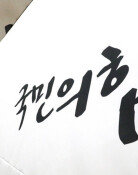[Focus] N. Korean makes flurry of overtures
[Focus] N. Korean makes flurry of overtures
Posted January. 15, 2001 12:22,
North Korea has made proposals for inter-Korea exchanges in a rush since the beginning of the year. Taking them as a positive signal for the acceleration of rapport between the two Koreas, the Seoul government is ready to respond in kind.
In a joint editorial published by its chief state media outlets and the 2001 convention for unification early this year, North Korea stressed faithful implementation of the June 15 joint declaration. Its proposal to open a Red Cross meeting in February was followed by overtures for early talks of working level officials for an exchange of taekwondo teams and fishery cooperation. These proposals came in great haste and in consecutively.
Analysts in the South are of the opinion that the North Koreans came the conclusion that improvement of ties with the South would benefit themselves over the long haul. The judgment was based on an official evaluation made by the ruling hierarchy in Pyongyang in the name of "chonghwa." Its concern over the advent of the conservative administration of President George W. Bush might have spurred them.
Considering the coming six months a transition period during which the new Washington leadership will define its North Korea policy, North Korea wants to demonstrate that detente has settled over the Korean peninsula.
The idea of "new thinking" advocated by North Korea's supreme leader Kim Jong-Il and published in the Jan. 4 issue of Nodong Shinmun (Workers Party organ) seems to underscore the positive stance of North Korea in making these overtures.
The new idea calls for "discarding old ideas and adopting a new way of thinking and new ideas," emphasizing the necessity of "an unusual speed to take a great leap toward rehabilitation under present circumstances."
What lies behind the sudden turn in favor of this "new thinking" is not yet clear. It hardly can be identified with glasnost or perestroika initiated by former Soviet leader Mikhail Gorbachev. North Korea watchers tend to take it as a signal for Pyongyang to break out of its old shell of self-reliant isolation and opt for a cautious path to pragmatism.
The call for increased speed to take a leap toward economic development might be construed as an attempt at intensifying the mobilization of North Korean populace in a revised version of the ¡°Chollima¡± movement that was the typical North Korean campaign for mass labor mobilization.
"I take it to signify North Korea's interest in walking in the footsteps of China's open-door policy, for what it is worth," said Sejong Institute research fellow Lee Jong-Sok, who heads the institute¡¯s inter-Korean relations team.





![“설거지해도 그대로”…냄비 ‘무지개 얼룩’ 5분 해결법 [알쓸톡]](https://dimg.donga.com/c/138/175/90/1/wps/NEWS/IMAGE/2026/01/15/133164664.3.png)

